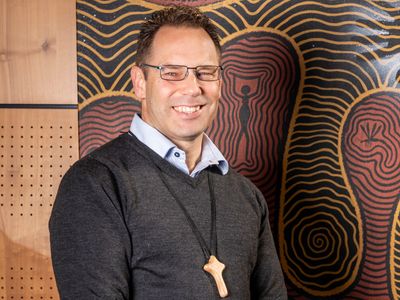Reconciliation Week: Be brave, make change
By Associate Chaplain Andy Fleming

National Reconciliation Week is a fantastic opportunity to acknowledge First Nations peoples and cultures, and also to reflect on our collective history.
Personally, I have found much joy in what I have learnt, and this learning has positively influenced my attitudes, practices and even my spirituality.
Indigenous culture teaches the value of, and respect for, those who have gone before us and what we can gain from the wisdom of their lived experience. For instance, during this time of heightened awareness about climate change, Aboriginal and Torres Strait Islander cultures have helped my understanding of how we are connected to the land and how my actions impact the environment. God has given us all the task of looking after Creation – not ‘owning’ creation but being responsible for it. Adopting the sustainable practices of First Nations peoples could assist in using our natural resources more appropriately.
My interest in reconciliation started simply through listening to music I enjoyed that also held strong messages and told stories. From Little Things Big Things Grow by Kev Carmody and Paul Kelly, Take the Children Away by Archie Roach, and even The Dead Heart by Midnight Oil, are songs that piqued my interest in issues confronting First Nations peoples.
This interest developed further as my friends and I learnt more about Indigenous affairs in the mid-1990s, following the landmark Mabo decision, then-Prime Minister Paul Keating’s Redfern speech, and the Native Title Act, all of which had occurred in the preceding years. This period culminated in the Walk for Reconciliation across the Sydney Harbour Bridge in 2000, where hundreds of thousands of people came together to acknowledge the importance of national reconciliation. I can remember a strong sense of community that day and hope for a better future for this country; a future in which First Nations history and peoples are recognised and acknowledged as the custodians of these lands now called Australia.
As I watch Radford students take the opportunities to build their own understanding of Indigenous cultures, this sense of hope is renewed. On Foundation Day at the end of Term 1, we heard from Aunty Violet Sheridan and Duncan Smith, the artist whose work Dirrum Dirrum and the Scar Tree hangs in the Chapel. At the Reconciliation Day events at the National Arboretum on Monday, several students assisted Reverend Hazel Davies making Sturt's Desert Pea craft remembering the colonial-era conflicts.

All students have enjoyed Uncle Johnny Huckle playing for them in Chapels and Junior School Celebrations. Uncle Johnny’s music is informative and invites the listener to engage with reconciliation. Over the past two weeks, many Year 10s have expressed interest in the opportunity to attend the Myall Creek Memorial on the June long weekend. These remarkable people assist our students to appreciate and value the diverse voices, perspectives, and knowledge within our community.
Peace be with you in the week ahead,
Chaplain Andy
Photo credit: Sturt's Desert Pea image by D Blumer is from the Botanic Gardens and Parks Authority of Western Australia.
